GMC SAVANA 1997 Owners Manual
Manufacturer: GMC, Model Year: 1997, Model line: SAVANA, Model: GMC SAVANA 1997Pages: 388, PDF Size: 20.17 MB
Page 251 of 388
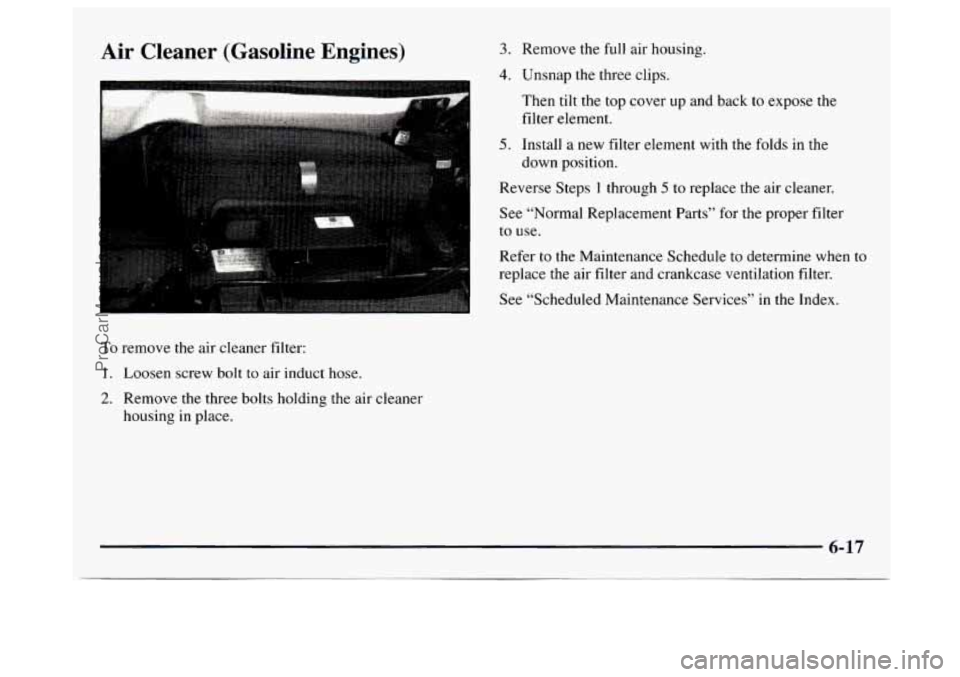
Air Cleaner (Gasoline Engines)
. ..-
To remove the air cleaner filter:
1. Loosen screw bolt to air induct hose.
2. Remove the three bolts holding the air cleaner
housing
in place.
3. Remove the full air housing.
4. Unsnap the three clips.
Then tilt the top cover up and back to expose the
filter element.
5. Install a new filter element with the folds in the
down position.
Reverse Steps
1 through 5 to replace the air cleaner.
See “Normal Replacement Parts” for the proper filter
to use.
Refer to the Maintenance Schedule
to determine when to
replace the air filter and crankcase ventilation filter.
See “Scheduled Maintenance Services” in the Index.
6-17
ProCarManuals.com
Page 252 of 388
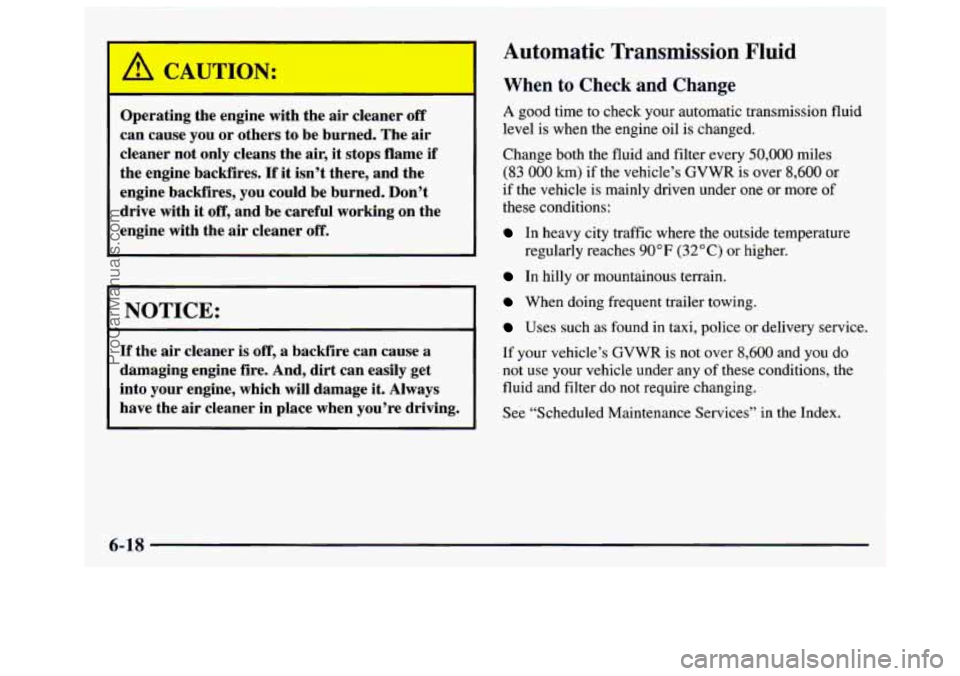
Operating the engine with the air cleaner off
can cause you or others to be burned. The air
cleaner not only cleans the air, it stops flame
if
the engine backfires. If it isn’t there, and the
engine backfires,
you could be burned. Don’t
drive with
it off, and be careful working on the
engine with the air cleaner off.
NOTICE:
If the air cleaner is off, a backfire can cause a
damaging engine fire. And, dirt can easily get
into your engine, which will damage
it. Always
have the air cleaner in place when you’re driving.
~ Automatic Transmission Fluid
~ When to Check and Change
~ A good time to check your automatic transmission fluid
level is when the engine oil
is changed.
Change both the fluid and filter every
50,000 miles
(83 000 km) if the vehicle’s GVWR is over 8,600 or
if the vehicle is mainly driven under one or more of
these conditions:
In heavy city traffic where the outside temperature
regularly reaches
90°F (32°C) or higher.
In hilly or mountainous terrain.
When doing frequent trailer towing.
Uses such as found in taxi, police or delivery service.
If your vehicle’s
GVWR is not over 8,600 and you do
not use your vehicle under any of these conditions, the
fluid and filter do
not require changing.
See “Scheduled Maintenance Services” in the Index.
6-18
ProCarManuals.com
Page 253 of 388
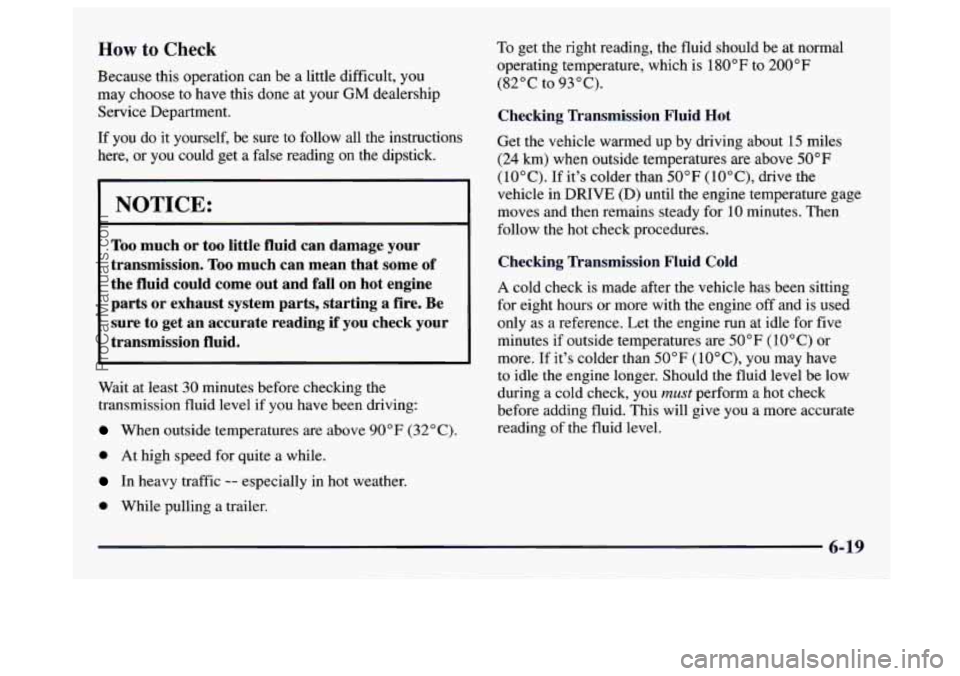
How to Check
Because this operation can be a little difficult, you
may choose to have this done at your
GM dealership
Service Department.
If you do it yourself, be sure to follow all the instructions
here, or you could get a false reading on the dipstick.
NOTICE:
I
Too much or too little fluid can damage your
transmission.
Too much can mean that some of
the fluid could come out and fall on hot engine
parts or exhaust system parts, starting a fire. Be
sure to get an accurate reading if
you check your
transmission fluid.
Wait at least 30 minutes before checking the
transmission fluid level if you have been driving:
When outside temperatures are above 90°F (32°C).
0 At high speed for quite a while.
In heavy traffic -- especially in hot weather.
0 While pulling a trailer.
To get the right reading, the fluid should be at normal
operating temperature, which is
180°F to 200°F
(82°C to 93°C).
Checking Transmission Fluid Hot
Get the vehicle warmed up by driving about 15 miles
(24 km) when outside temperatures are above 50°F
(10°C). If it's colder than 50°F (lO"C), drive the
vehicle in
DRIVE (D) until the engine temperature gage
moves and then remains steady for
10 minutes. Then
follow the hot check procedures.
Checking Transmission Fluid Cold
A cold check is made after the vehicle has been sitting
for eight hours or more with the engine off and is used
only as a reference. Let the engine run at idle for five
minutes if outside temperatures are
50°F (10°C) or
more. If it's colder than
50°F (lO"C), you may have
to idle the engine longer. Should the fluid level be low
during a cold check, you
must perform a hot check
before adding fluid. This will give
you a more accurate
reading of the fluid level.
6-19
ProCarManuals.com
Page 254 of 388
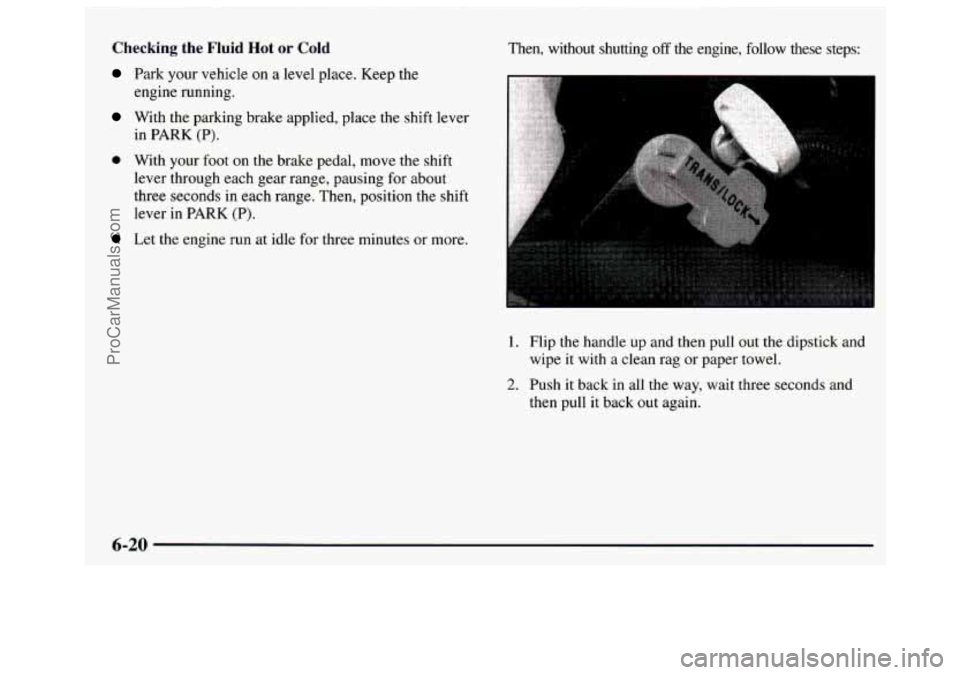
Checking the Fluid Hot or Cold
Park your vehicle on a level place. Keep the
engine running.
With the parking brake applied, place the shift lever
a With your foot on the brake pedal, move the shift
in
PARK (P).
lever
through each gear range, pausing for about
three seconds in each range. Then, position the shift
lever in PARK
(P).
Let the engine run at idle for three minutes or more. Then, without shutting
off the engine, follow these steps:
1. Flip
the handle up and then pull out the dipstick and
wipe
it with a clean rag or paper towel.
2. Push it back in all the way, wait three seconds and
then pull it back
out again.
6-20
ProCarManuals.com
Page 255 of 388
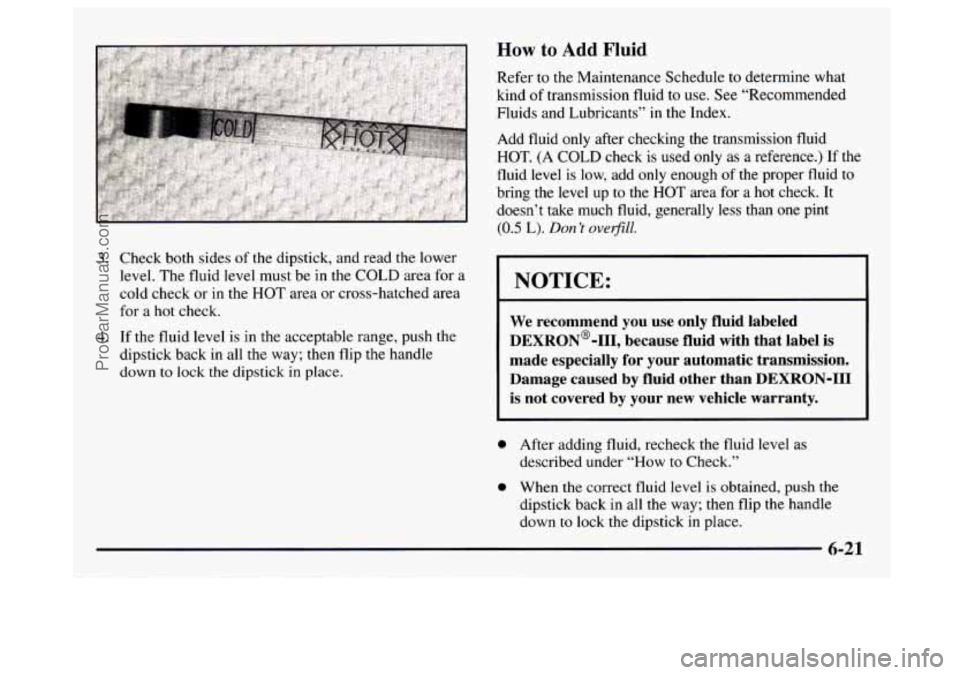
3. Check both sides of the dipstick, and read the lower
level. The fluid level must be in the COLD area for
a
cold check or in the HOT area or cross-hatched area
for
a hot check.
4. If the fluid level is in the acceptable range, push the
dipstick back in all the way; then flip the handle
down
to lock the dipstick in place.
How to Add Fluid
Refer to the Maintenance Schedule to determine what
kind
of transmission fluid to use. See “Recommended
Fluids and Lubricants’’
in the Index.
Add fluid only after checking the transmission fluid HOT. (A COLD check is used only as a reference.) If the
fluid
level is low, add only enough of the proper fluid to
bring the level up to the HOT area for a hot check. It
doesn’t take much fluid, generally less than one pint
(0.5 L). Don’t ovefill.
NOTICE:
We recommend you use only fluid labeled
DEXRON@-111, because fluid with that label is
made especially for your automatic transmission.
Damage caused by fluid other than DEXRON-I11
is not covered by your new vehicle warranty.
0 After adding fluid, recheck the fluid level as
described under “How to Check.”
0 When the correct fluid level is obtained, push the
dipstick back in all the way; then flip the handle
down
to lock the dipstick in place.
ProCarManuals.com
Page 256 of 388
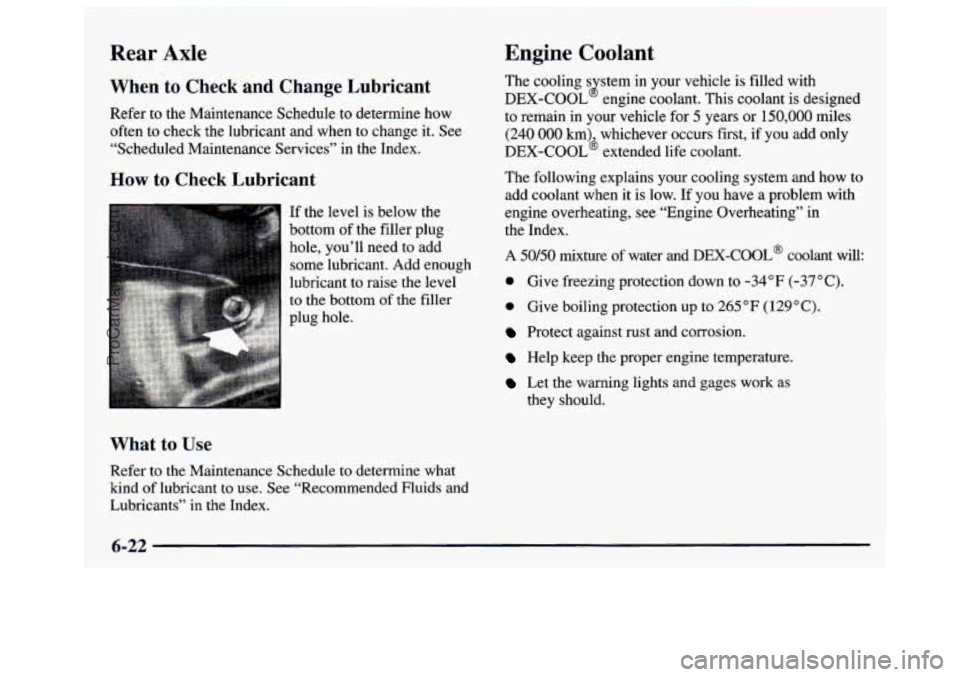
Rear Axle Engine Coolant
When to Check and Change Lubricant
Refer to the Maintenance Schedule to determine how
often to check the lubricant and when to change it. See
“Scheduled Maintenance Services” in the Index.
How to Check Lubricant
If the level is below the
bottom
of the filler plug
hole, you’ll need to add some lubricant. Add enough
lubricant to raise the level
to the bottom
of the filler
plug hole.
What to Use
Refer to the Maintenance Schedule to determine what
kind of lubricant to use. See “Recommended Fluids and
Lubricants” in
the Index. The cooling
s stem in your vehicle
is filled with
DEX-COOL
8 engine coolant. This coolant is designed
to remain in your vehicle for
5 years or 150,000 miles
(240 000 km) whichever occurs first, if you add only
DEX-COOL’ extended life coolant.
The following explains your cooling sysre~ And how to
add coolant when it is low. If
you have a problem with
engine overheating,
see “Engine Overheating” in
the Index.
A 50/50 mixture of water and DEX-COOL’ coolant will:
0 Give freezing protection down to -34°F (-37°C).
0 Give boiling protection up to 265 “F (129°C).
Protect against rust and corrosion.
Help keep the proper engine temperature.
Let the warning lights and gages work as
they should.
6-22
ProCarManuals.com
Page 257 of 388
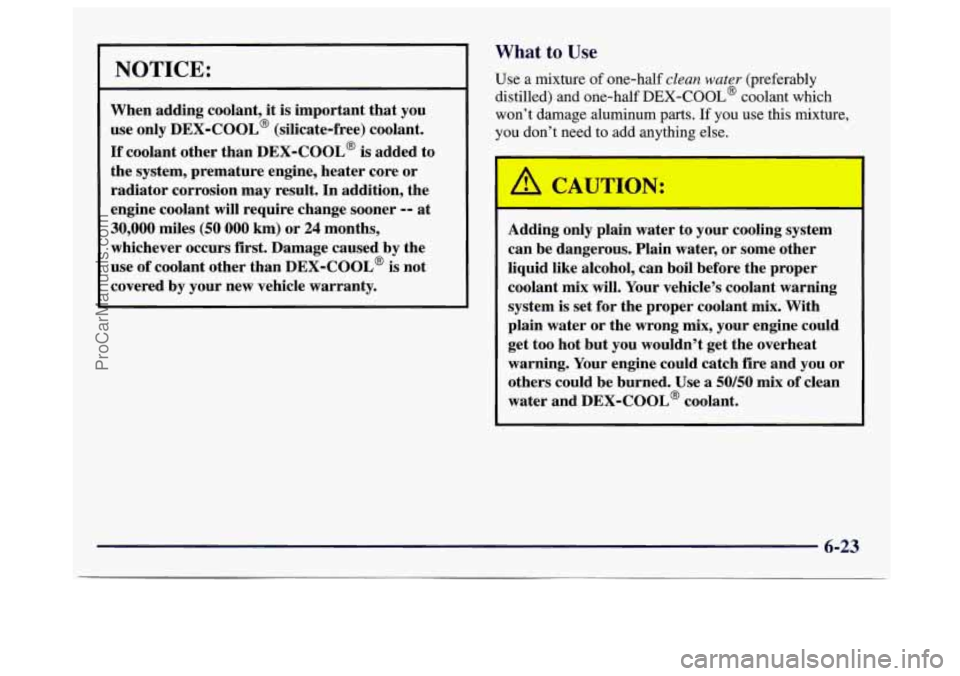
NOTICE:
When adding coolant, it is important that you
use only
DEX-COOL@ (silicate-free) coolant.
If coolant other than DEX-COOL@ is added to
the system, premature engine, heater core or
radiator corrosion may result. In addition, the
engine coolant will require change sooner
-- at
30,000 miles (50 000 km) or 24 months,
whichever occurs
first. Damage caused by the
use of coolant other than DEX-COOL@
is not
covered by your new vehicle warranty.
What to Use
Use a mixture of one-half clean water (preferably
distilled) and one-half
DEX-COOL@ coolant which
won’t damage aluminum parts.
If you use this mixture,
you don’t need to add anything else.
Adding only plain water to your cooling system
can be dangerous. Plain water, or some other
liquid like alcohol, can boil before the proper
coolant mix will. Your vehicle’s coolant warning
system is set for the proper coolant mix. With
plain water or the wrong mix, your engine could
get too hot but you wouldn’t get the overheat
warning. Your engine could catch fire and
you or
others could be burned. Use a
50/50 mix of clean
water and DEX-COOL@ coolant.
6-23
ProCarManuals.com
Page 258 of 388
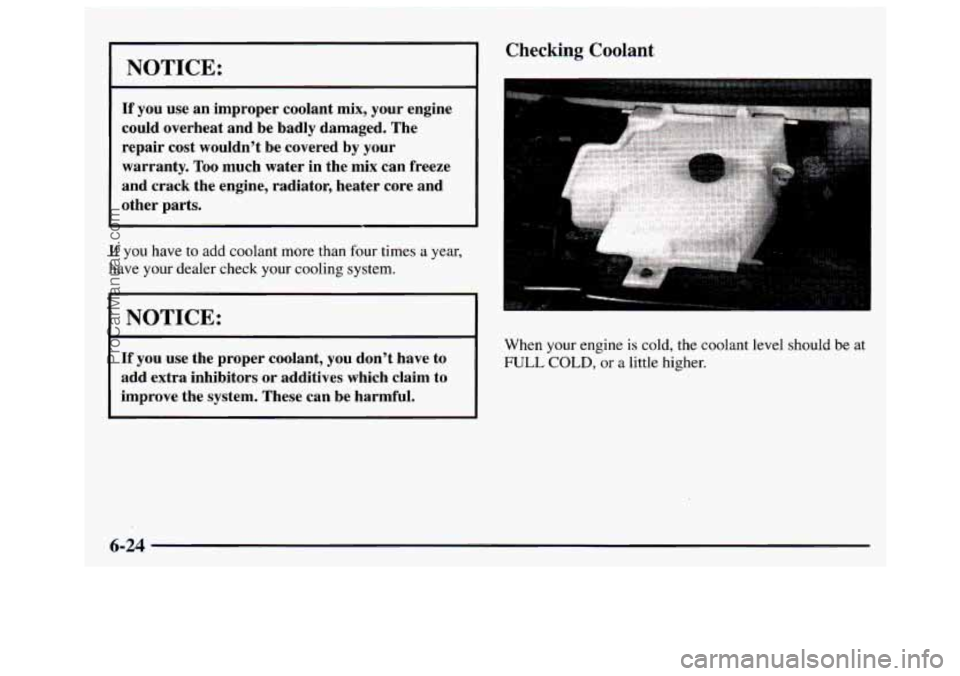
NOTICE:
If you use an improper coolant mix, your engine
could overheat and be badly damaged. The
repair cost wouldn’t be covered by your
warranty. Too much water in the mix can freeze
and crack the engine, radiator, heater core and
other parts.
If you have to add coolant more than four times a year,
have your dealer check your
cooling system.
I NOTICE: I
If you use the proper coolant, you don’t have to
add extra inhibitors or additives which claim to
improve the system. These can be harmful.
Checking Coolant
When yo bur engine is cold, the coolant level sho
FULL COLD, or a little higher. uld
be at
6-24
ProCarManuals.com
Page 259 of 388
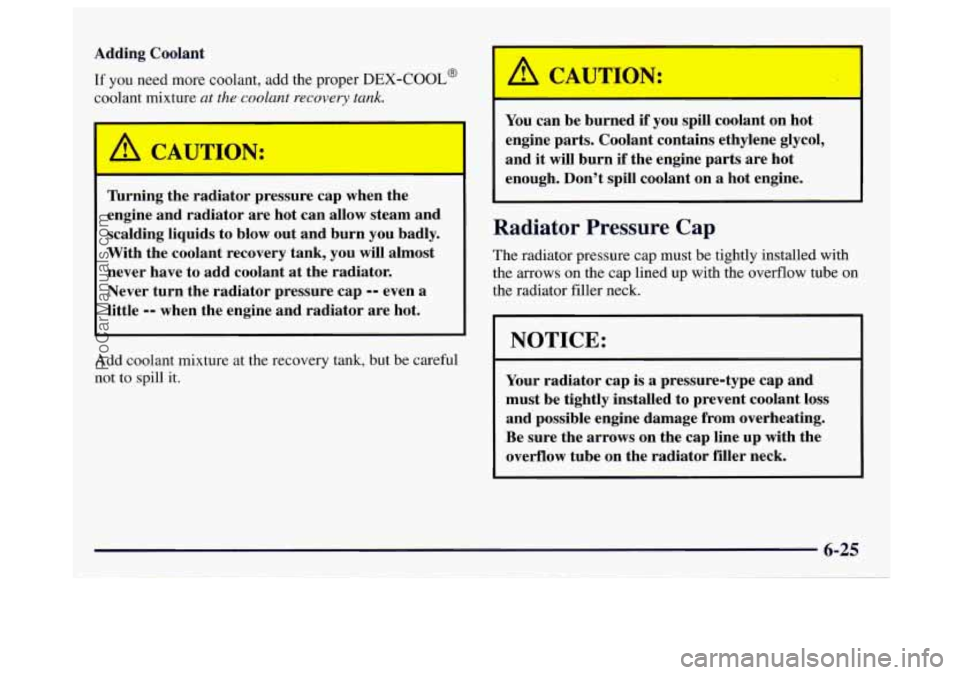
Adding Coolant
If you need more coolant, add the proper DEX-COOL@
coolant mixture at the coolant recovery tank.
lbrning the radiator pressure cap when the
engine and radiator are hot can allow steam and
scalding liquids to blow out and burn you badly.
With the coolant recovery tank, you will almost
never have to add coolant at the radiator.
Never turn the radiator pressure cap
-- even a
little
-- when the engine and radiator are hot.
-
Add coolant mixture at the recovery tank, but be careful
not to spill
it.
I
You can be burned if you spill coolant on hot
engine parts. Coolant contains ethylene glycol,
and it will burn if the engine parts
are hot
enough. Don't spill coolant on
a hot engine.
Radiator Pressure Cap
The radiator pressure cap must be tightly installed with
the
arrows on the cap lined up with the overflow tube on
the radiator filler neck.
NOTICE:
Your radiator cap is a pressure-type cap and
must be tightly installed to prevent coolant loss
and possible engine damage from overheating.
Be sure the arrows on the cap line up with the
overflow tube on the radiator filler neck.
ProCarManuals.com
Page 260 of 388
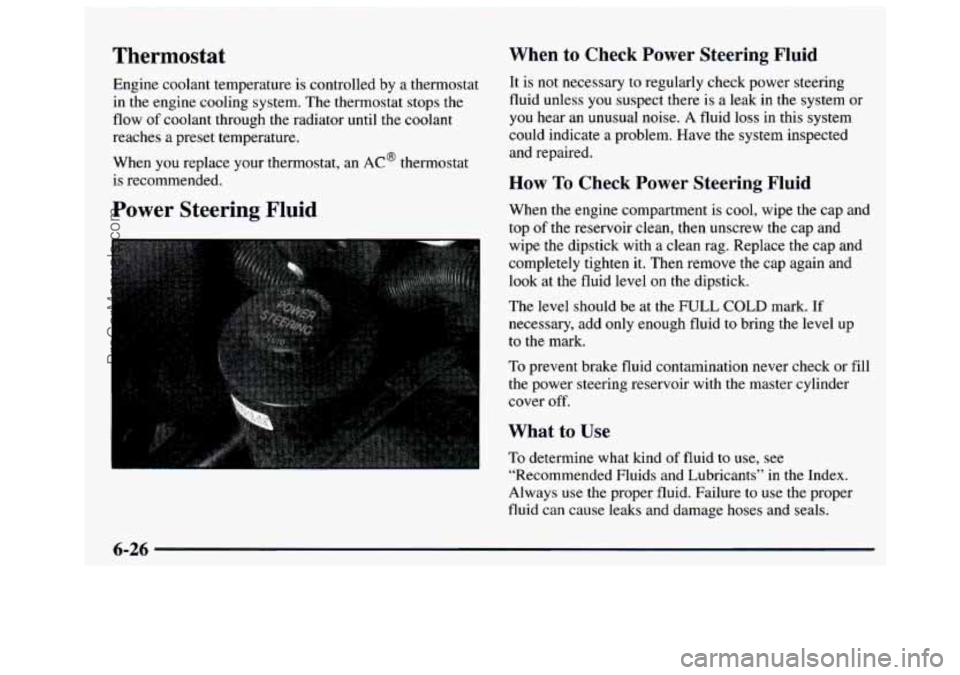
Thermostat
Engine coolant temperature is controlled by a thermostat
in the engine cooling system. The thermostat stops the
flow of coolant through the radiator until the coolant
reaches a preset temperature.
When you replace your thermostat, an
AC@ thermostat
is recommended.
Power Steering Fluid
When to Check Power Steering Fluid
It is not necessary to regularly check power steering
fluid unless you suspect there
is a leak in the system or
you hear an unusual noise.
A fluid loss in this system
could indicate a problem. Have the system inspected
and repaired.
How To Check Power Steering Fluid
When the engine compartment is cool, wipe the cap and
top
of the reservoir clean, then unscrew the cap and
wipe the dipstick with a clean rag. Replace the cap and
completely tighten it. Then remove the cap again and
look at the fluid level
on the dipstick.
The level should be at the FULL COLD mark.
If
necessary, add only enough fluid to bring the level up
to the mark.
To prevent brake fluid contamination never check or fill
the power steering reservoir with the master cylinder
cover off.
What to Use
To determine what kind of fluid to use, see
“Recommended Fluids and Lubricants” in the Index.
Always use the proper fluid. Failure to use the proper
fluid can cause leaks and damage hoses and seals.
6-26
ProCarManuals.com